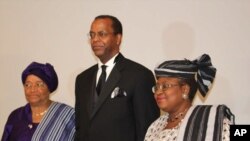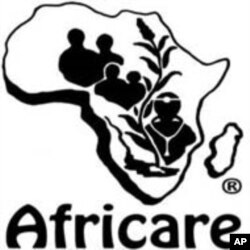Two of Africa’s most powerful women have been speaking about their experiences and hopes for Africa.
Liberian President Ellen Johnson-Sirleaf, the first elected female president on the continent and Nigeria’s Ngozi Nkonjo-Iweala, managing director of the World Bank, shared their views last Friday evening with Africare President Darius Mans and a select number of journalists.
Africare is a U.S.-based non-profit organization specializing in development aid for Africa and the conversation was part of this year’s Africare Bishop John T. Walker Memorial Dinner.
On some of the challenges confronting Africa, President Sirleaf said youth unemployment and urban population growth were two of the most serious problems facing her government.
“For one thing, the challenge of youth employment and youth engagement in productive endeavor is perhaps one of our greatest challenges. What we want to do is to make sure that we prepare them for private sector endeavors by giving them skill. Urbanization is indeed the real problem. We want to meet that through a rigorous decentralization program whereby we can make the rural areas sufficiently productive and empowered to be able to absorb and to start a reversal of the movement,” President Sirleaf said.
World Bank official Ngozi Nkonjo-Iweala said the bank advises African countries in dealing with their challenges, including infrastructure development.
“Infrastructure is a big, big challenge. If we don’t tackle the challenge of infrastructure I really do not believe that, across the continent, we’ll be able to make much headway. We need to speed up growth. So, we’re focusing on that, not just within countries, but also looking at regional integration and regional infrastructure,” Nkonjo-Iweala said.
Both women talked about the importance of women in Africa’s governing and development. Ngozi Nkonjo said girls and women are the future of Africa.
“Any country that focuses on their (women’s) development will do better in economic development, in social development. And so, we really need to focus our attention, and, I must say, maybe I’m a little bit biased. Women also tend to be more transparent, they tend to have fewer egos and, so, I think that they tend to move countries along and sectors along,” Nkonjo-Iweala said.
President Sirleaf, who is running for re-election next year, said she will be running on her record of moving Liberia from a failed state to once again being a respected country.
She explained, for the first time, why she dismissed almost her entire cabinet last week.
“We’re going into the final leg of this administration; we’ve set certain goals; we want to start off in this dry season when we can get most of our work done with as much energy and commitment and dynamism as possible. The whole idea is to say to the team, ‘Now, we’re going to stop, reflect, determine who wants to pursue something else and give them the opportunity to do that, and that those that are ready to work will set specific goals for this year and we will judge them by the achievement of those goals,” President Sirleaf said.
President Sirleaf advised young African women to get their education and be prepared to vie for leadership on the basis of competitiveness.
The 2010 Africare Bishop John T. Walker Distinguished Humanitarian Award was given to World Bank managing director Ngozi Nkonjo-Iweala for the sweeping economic and social reforms she made to improve Nigeria’s financial stability.
Ngozi Nkonjo-Iweala said she was happy and honored by the recognition.
“I’m thrilled and I was very surprised when I got the honor, and I regard it not as something to sit back and sort of enjoy, but as a charge to do more, to try to contribute more to the continent, as a charge to work with Africare in partnership trying to join in the good they’ve been doing and see how we can collaborate more with the World Bank to leverage both our strengths for Africa,” Nkonjo-Iweala said.
Former South African President Nelson Mandela received the Lifetime Achievement Award for his efforts to improving the lives of the people of Africa and around the world.
Mr. Mandela’s daughter, Zindzi, and grandson, Zondwa Mandela, received the award on behalf of their father and grandfather.








